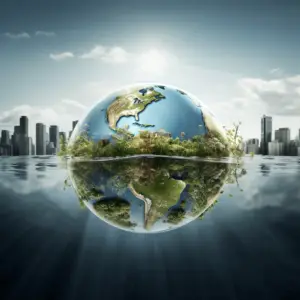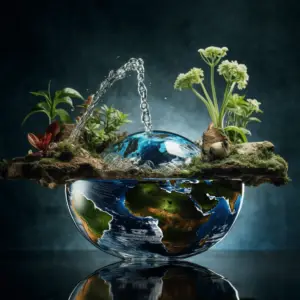Table of Contents
Introduction to water conservation
Water conservation a precious resource that sustains life. We must conserve it to ensure its availability for future generations. Simple measures like fixing leaky faucets and using efficient appliances can reduce daily consumption.
Rainwater harvesting is another way to conserve water, providing an alternative source. It’s gaining popularity in regions with water scarcity.
An inspiring example is a small village in India. Faced with drought, the villagers united to build check dams and revitalize their local lakes. Their collective action achieved a sustainable solution.
Water conservation is key – no water, no future!
Importance of water conservation

Water conservation is essential in the present world. With the rise in population and the diminishing of water resources, it is essential that we take essential steps to save this vital resource.
- Conserving water aids in protecting the environment. By cutting our utilization, we can minimize the pressure on freshwater sources, such as lakes and rivers.
- Water conservation is essential for sustainable agriculture. Farmers can apply methods like drip irrigation to limit their water usage and guarantee that crops have sufficient nourishment.
- Another significant part of water conservation is its influence on energy efficiency. By conserving water, we also save energy that is necessary for processing and providing it to households and industries.
Moreover, it is imperative to teach people about the value of water conservation. Many people are unaware of the results of inefficient habits, such as leaving taps running or taking long showers. By raising awareness, we can motivate others to take up responsible water usage habits.
In numerous developing countries, access to safe and clean drinking water is still a struggle. Water conservation efforts can assist in addressing this problem by guaranteeing that available resources are utilized efficiently, helping those who require it most.
The World Wildlife Fund (WWF) reports that agricultural activities make up about 70% of global freshwater consumption. This eye-catching figure underscores the urgent need for successful water conservation strategies everywhere.
Saving water at home is not just about preserving a valuable resource, it’s also an amazing way to practice your ninja skills by subtly turning off that dripping tap.
Water conservation methods for households
Fix any leaks in faucets, toilets, or pipes to prevent wastage. Install low-flow showerheads and aerators to reduce water usage. Opt for efficient appliances like dishwashers and washing machines with high water-saving ratings.
Collect and reuse rainwater for gardening or cleaning. Run dishwasher and washing machine with full loads. Use soaker hoses or drip irrigation systems in gardens.
Turn off faucet while brushing teeth or washing dishes.
Save gallons of water each day by adopting these simple methods.
According to EPA, fixing household leaks can save 10,000 gallons of water annually. Don’t waste water like your ex wasted your time, implement effective conservation measures for industries and agriculture.
Water conservation measures for industries and agriculture
Water conservation is essential for industries and agriculture. Efficient water management can help these sectors minimize their water use and aid sustainable development. To do this, they can:
- Invest in advanced irrigation systems such as drip irrigation and precision sprinklers.
- Capture rainwater with rainwater harvesting systems.
- Treat and reuse wastewater to reduce pollution and conserve water.
- Encourage the use of high-efficiency equipment and prompt leak repairs.
- Provide training programs and resources to raise awareness about water conservation.
These strategies must be tailored to regional challenges like drought or limited freshwater resources. For example, in Punjab, India, direct-seeded rice cultivation has enabled farmers to save roughly 2,500 liters of water per hectare.
Finally, governments should promote water conservation. They can make saving water as exciting as watching paint dry!
Government initiatives and policies for promoting water conservation
Government initiatives for water conservation have been crucial for sustainable use of this vital resource. Policies like water pricing reforms, public education and regulations on industrial water usage have been put in place. These efforts focus on raising awareness of water conservation and responsible behavior among people, communities and businesses.
Innovative technologies for water conservation have also been encouraged. This includes rainwater harvesting systems, efficient irrigation methods and greywater use for non-potable purposes. Governments have done this by offering subsidies and grants to reduce water consumption and minimise wastage.
Government departments have been working with local communities to create strategies for water conservation, tailored to regional needs and issues like water scarcity or pollution. This collaborative approach helps to create realistic targets and action plans that can be implemented at a grassroots level.
One example of a government initiative was seen in California during 2012-2017 when they had a severe drought. Strict regulations such as limits on outdoor watering, bans on certain high-water-consuming activities and financial incentives for efficient plumbing fixtures were introduced. These measures led to a substantial drop in water consumption and highlighted the role governments can play in mitigating crises related to water scarcity. This California example has inspired other regions worldwide, and emphasised the necessity of proactive policies for sustainable water management.
Water conservation in urban planning and infrastructure development
Leak detection and repair can reduce water demand. Rainwater harvesting systems can capture and use rain for non-potable needs like irrigation or flushing toilets. Permeable pavements, rooftop gardens, and bioretention basins can help manage stormwater runoff. Greywater recycling treats wastewater from sinks, showers, and laundry for reuse in non-drinking applications.
For example, Singapore has adopted a comprehensive approach to ensure water sustainability. This includes collecting rainwater, harvesting recycled wastewater, importing freshwater, and desalinating seawater. This has enabled Singapore to become largely self-sufficient in terms of its water supply.
Water conservation: a necessary measure, for our planet is 70% water, but appears unaware of our efforts.
Educating and raising awareness about water conservation

Water conservation is a must! Spreading awareness is essential for our planet’s well-being. To make conscious choices and take action, we need to educate individuals.
This includes reducing our own water usage and adopting sustainable practices. It can raise awareness about simple yet effective ways to conserve water, like fixing leaky faucets, using water-saving appliances, and practicing responsible irrigation techniques.
We must create policies to reduce pollution and protect our freshwater sources. We must instill a sense of responsibility and understanding among individuals, so we can all work together to ensure future access to clean water.
Digging into history, we find inspiring stories of communities coming together to educate themselves about water conservation. Ancient civilizations like the Indus Valley Civilization and ancient Rome understood the value of water and developed systems to store and distribute it efficiently. They realized the importance of preserving this vital resource for future generations.
It’s time to start saving the world one drop at a time – and having some fun while doing it!
Conclusion: The importance of individual and collective efforts in preserving water resources.
We must act now! Every person must take up the responsibility to conserve water daily. Governments and communities should follow sustainable practices. Together, we can make sure future generations have access to clean water. Investing in water-saving tech and education is an absolute must for long-term preservation. Let’s work together to protect this precious resource before it’s too late. We can make a difference in preserving water resources and protecting our planet’s future.
